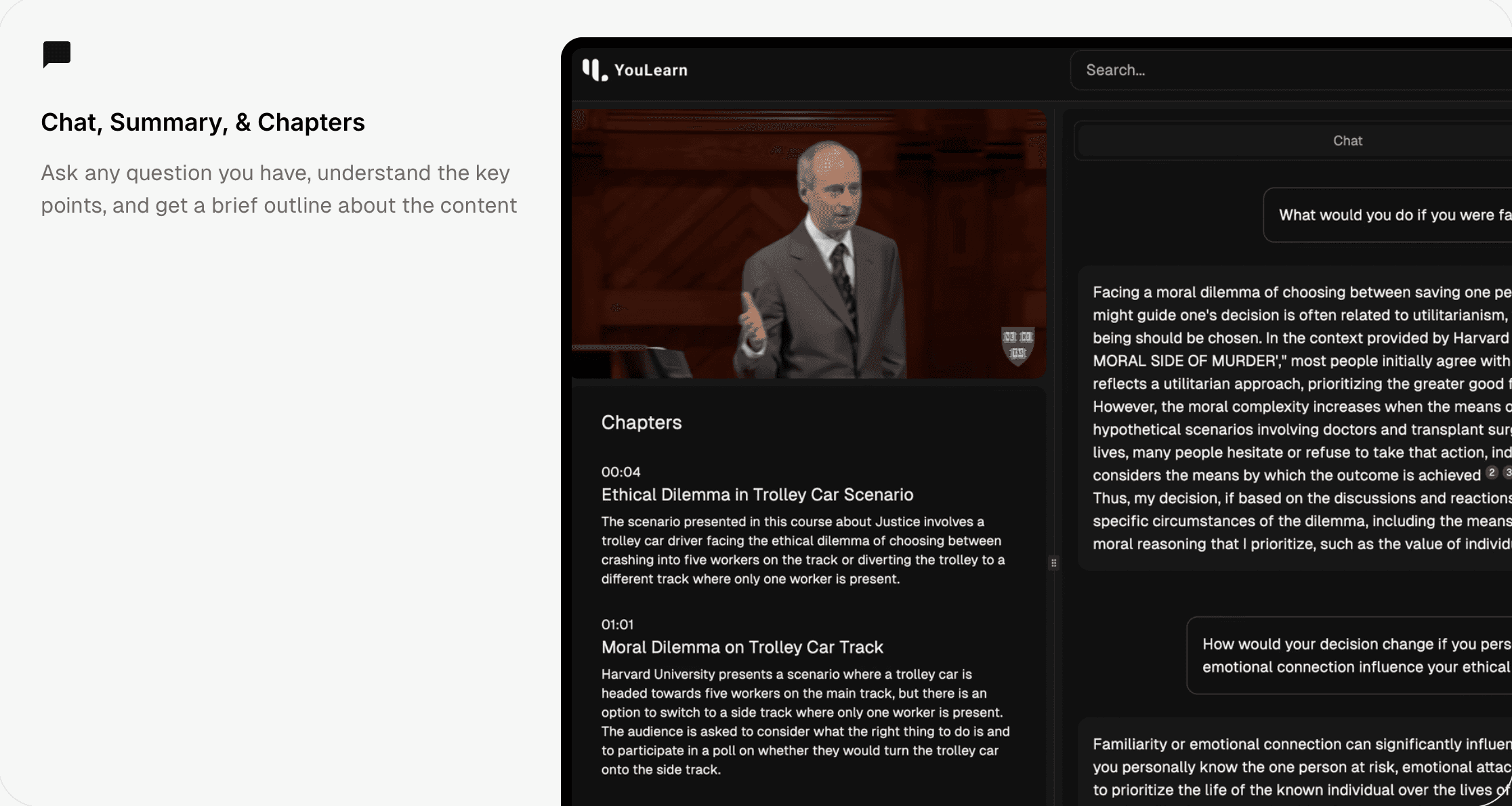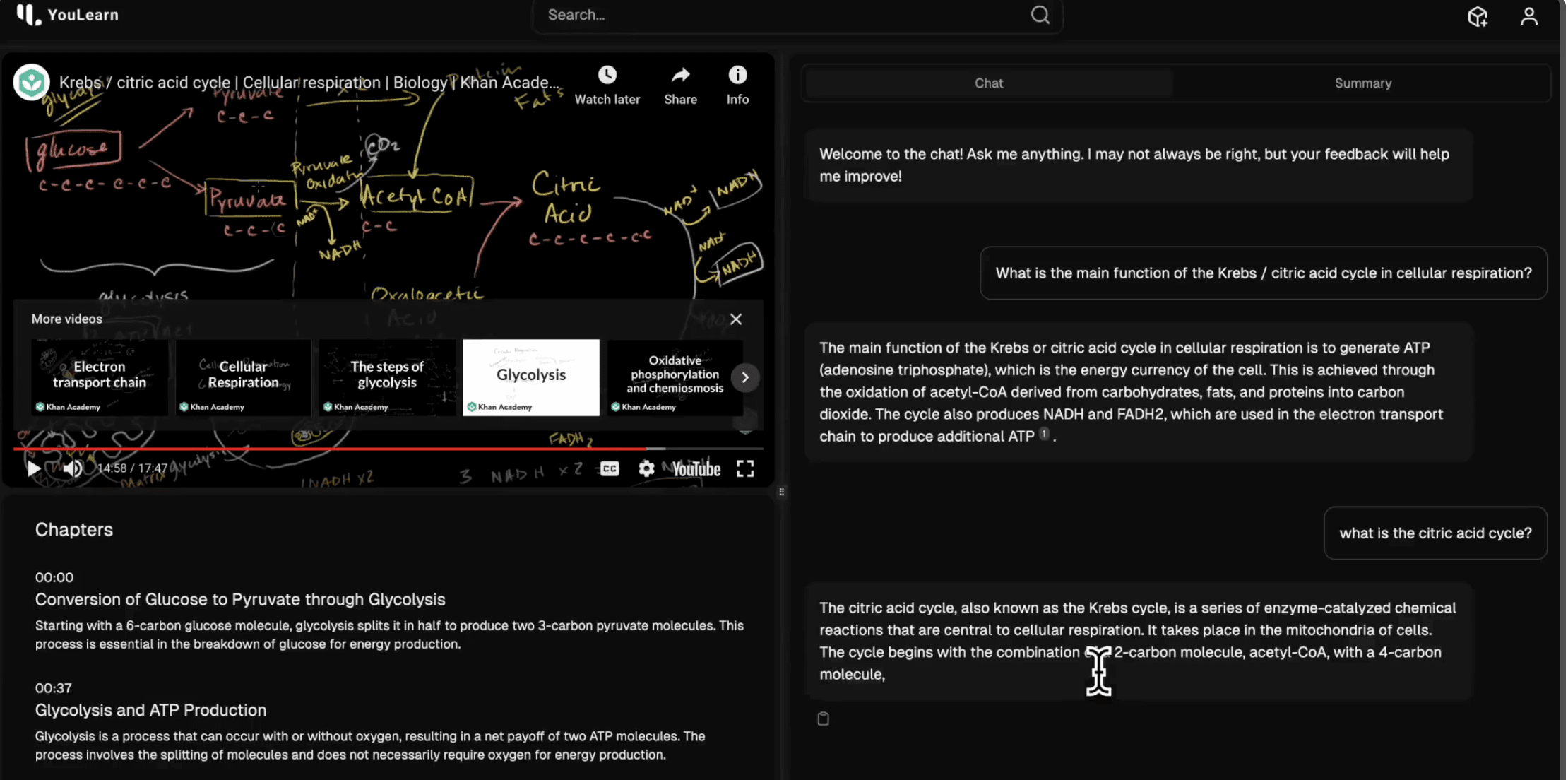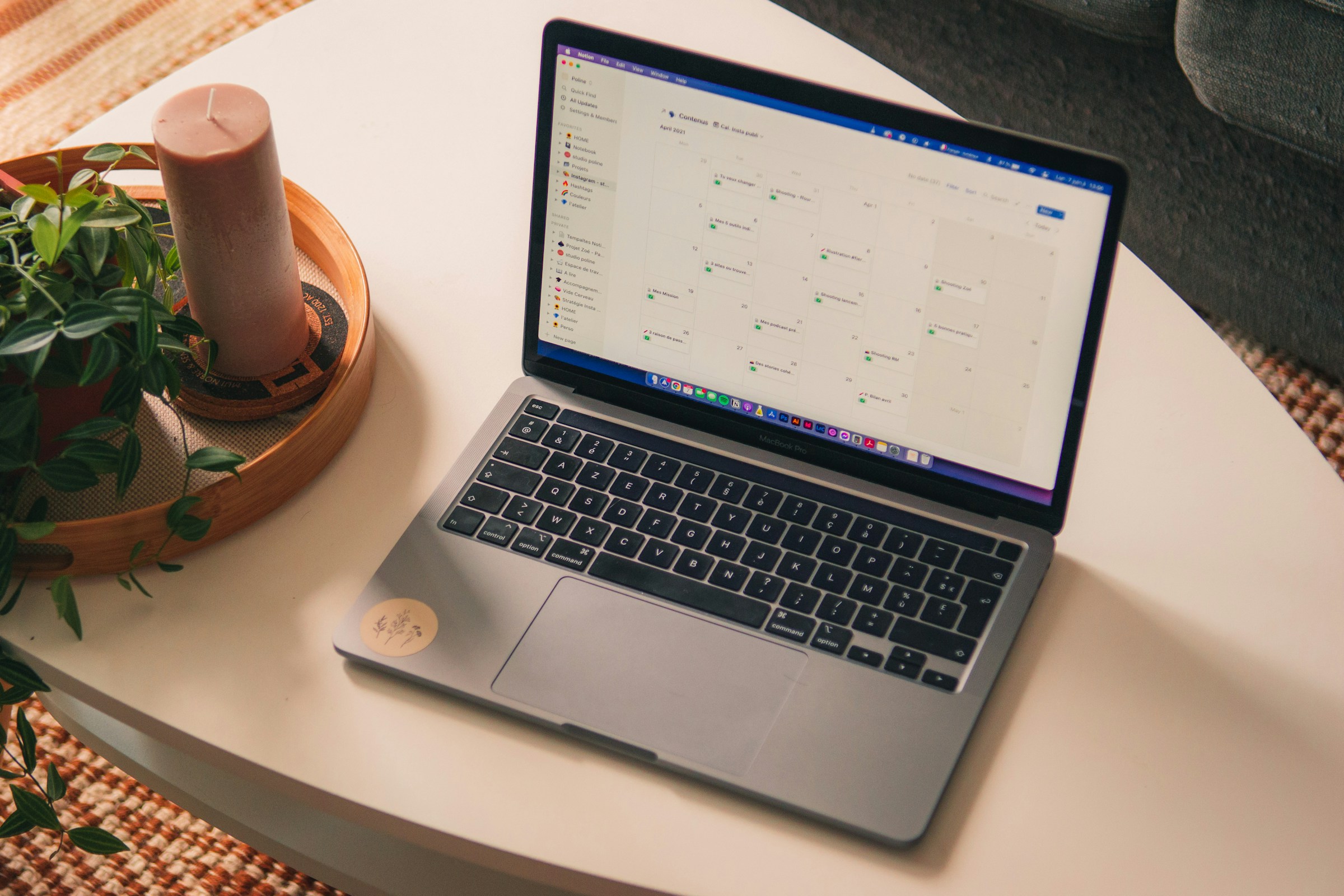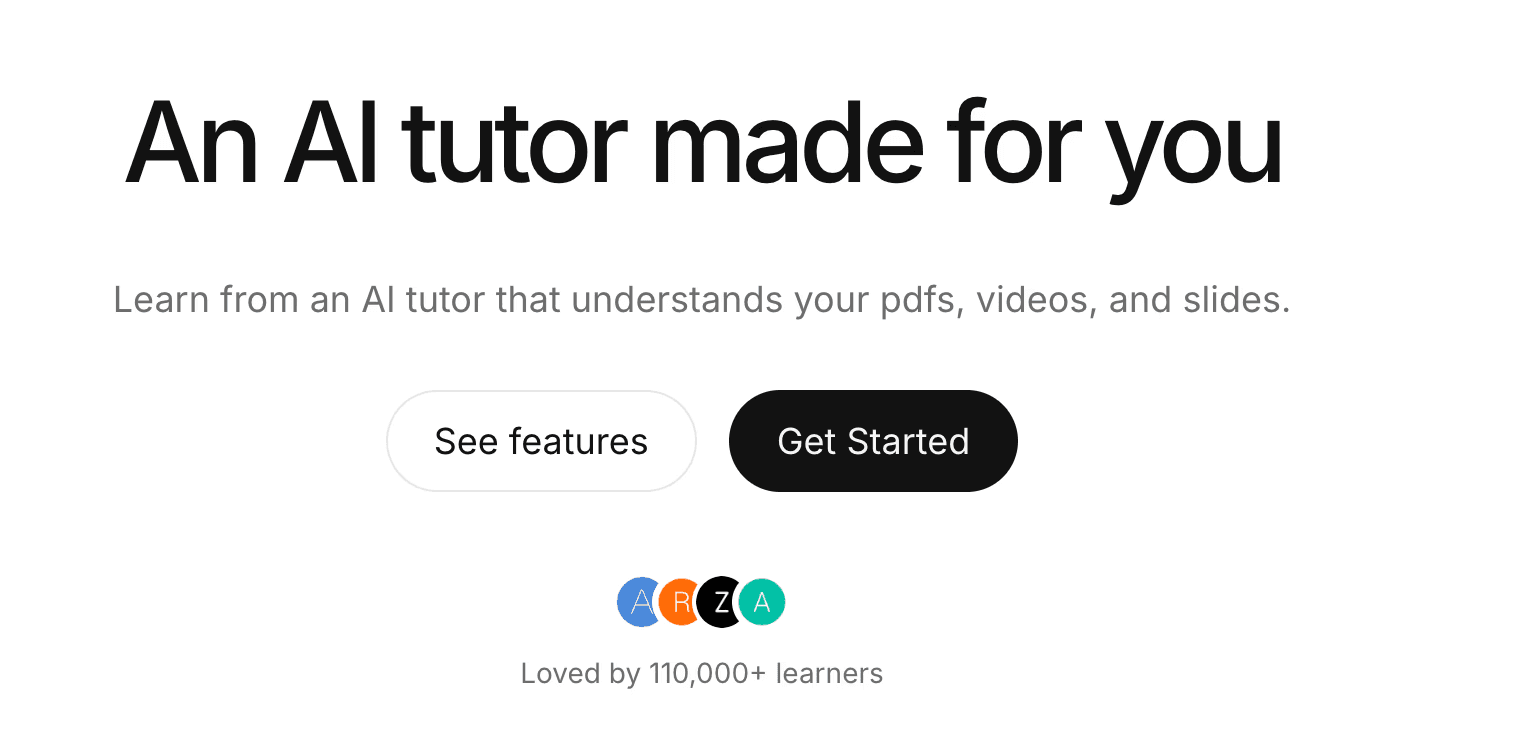11 Best College Study Tips Every Student Must Know
Sep 23, 2024

YouLearn Team
College can be a lot like juggling. At first, it seems manageable. But as soon as you add classes, extracurricular activities, and social life to the mix, things get chaotic quickly. Suddenly, you’re bombarded with so many assignments it’s almost impossible to keep your head above water. You're not alone if you’ve struggled to stay organized and on top of your studies. Countless students face this challenge at the start of each semester. And you wonder, How to Be a Better Student? Luckily, this guide on college study tips offers valuable insights to help you get ahead of the curve, reduce stress, and regain your footing.
For instance, did you know that personalized learning through AI could help you get organized and perform better academically? What is personalized learning through AI? It uses artificial intelligence to create customized educational experiences that adapt to each student’s unique needs and preferences. By accessing a wealth of information, AI creates personalized learning plans to help students achieve their academic goals.
YouLearn’s solution, the personal AI tutor, is a valuable tool for helping readers achieve their objectives, such as access to personalized learning through AI. Avoid technical jargon and focus on the benefits of their goals.
Table of Contents
What Is The Best Study Method for College Students?

One of the most effective strategies for improving learning is spaced-out studying. Instead of cramming for a test, distribute practice over time, also known as “distributed practice.” Studies show that this approach leads to better performance than cramming, even when students who cram for a test score just as high on the test as those who use distributed practice.
That’s because, unlike cramming, spaced-out studying improves retention of information for the long term. One of the best ways to approach studying for finals is to work a little on each subject every day for several weeks until the big test. Not only does this approach help you learn the material more deeply, but it also reduces anxiety and helps you avoid procrastination.
Don’t Just Study for One Subject at a Time
Instead of spending several hours the night before a test on one subject, you want to study a little bit each day for several weeks leading up to the test. This will help you learn the material more deeply and retain much more for the long term. Suppose you must memorize class material (names, dates, formulas). In that case, it’s best to make flashcards for this material and review it periodically throughout the day rather than one long memorization session.
Create a Study Schedule
To space out studying over time, you need control over your schedule. Keeping a list of tasks to complete daily will help you to include regular active studying sessions for each class. Try to do something for each class each day. Be specific and realistic regarding how long you plan to spend on each task—you should not have more tasks on your list than you can reasonably complete during the day.
For example, you may do a few problems per day in math rather than all of them the hour before class. In history, you can spend 15-20 minutes each day actively studying your class notes. Thus, your studying time may still be the same length, but rather than only preparing for one class, you will be preparing for all your courses in short stretches. This will help you focus, stay on top of your work, and retain information.
Tackle Goals to Avoid Procrastination
In addition to learning the material more deeply, spacing out your work helps stave off procrastination. Rather than facing the dreaded project for four hours on Monday, you can face the dreaded project for 30 minutes each day. The shorter, more consistent time to work on a dreaded project will likely be more acceptable and less likely to be delayed to the last minute.
Related Reading
• How to Pass a Test
• How to Be a Good Student
• Back to School Tips
How Can I Focus 100% On Studying?

1. Make a Plan: Map Out Your Study Schedule
You’re probably aware of when papers are due, and even if you don’t know the exact dates of your exams, you likely know the week or weeks when they’re scheduled. So why not get a head start on your studying by mapping out your work schedule now? Whether reading, researching, writing, or revising, give yourself a target to achieve at the end of each week so you know you’re on track to have everything ready in time for the deadlines. Invest in a wall calendar or diary to mark down important dates. It’ll help you to see how much time you have left and when you will work on what.
2. Create a Relaxed Study Environment
If you plan on studying from home, ensure your room is tidy, and your desk is clear of clutter. A clean space makes way for a clear mind, which is just what you need when you’re working. You’ll also find it easier to focus if your study space is somewhere you enjoy being. A potted plant and decent lighting are small steps to creating your ultimate study haven. Calm music and scented reed diffusers can help relax your senses, putting you in a reasonable frame of mind to get some work done.
3. Take Regular Breaks to Stay on Track
Studies repeatedly show that productivity increases when students take regular breaks. By breaking down your revision or essay writing into manageable chunks, you’re more likely to remain focused and keep your brain engaged on the subject at hand. For every 45 minutes of solid work you do, take a 15-minute break away from your desk. Whether it’s popping outside for fresh air, having a quick tidy, or doing some stretches, we guarantee your brain will thank you later!
4. Don’t Get Distracted by Social Media
Nowadays, it’s almost too easy to be distracted by social media. When your phone buzzes in your pocket, it’s impossible to ignore the alluring call of a Snapchat or Instagram notification. Before you know it, you’ve spent the afternoon scrolling through cute animal pictures and funny videos, and no work has been done. But fear not; software developers have found a way to help students when they need to focus.
You can download browser extensions such as "StayFocusd," which blocks your most distracting websites for a set amount of time. Smartphone users can install apps such as "Offtime," which allow you to filter modes such as Work or Friends so you can only access the things you need and won’t be distracted by any unnecessary gaming or social media apps.
5. Drink Plenty of Water and Eat Well
During exam periods, it’s often the case that students become so focused on their work that they forget to focus on their well-being. The easiest way to help yourself perform to the best of your ability is to stay hydrated and avoid junk food. Set a reminder on your phone to drink a large glass of water every couple of hours and snack on healthy fruit and nuts during your studies. A lack of water or eating foods with high levels of fat will make you feel irritable and lethargic, which is the last thing you’ll want when trying to be productive!
6. Reward Yourself for a Job Well Done
Rewarding yourself for studying is critical to staying motivated. These can be small rewards, such as a square of chocolate for each paragraph you write or watching an episode of your favorite Netflix series when you’ve mastered revising a specific topic. When you feel you’ve been working hard or assignments have been handed in and exams finished, reward yourself with more significant things, such as a night out with friends or buying those boots you’ve had your eye on for months. Just because it’s exam season doesn’t mean you shouldn’t enjoy yourself.
7. Don’t Do All-Nighters, You Will Regret It!
Working all night keeps you on track with your studies. But doing all-nighters and functioning without sleep can severely impact your health and, in turn, impede your work. A good night’s sleep is essential to help you stay focused and learn efficiently. Sleep helps consolidate memory, essential when studying and converting short-term memory to long-term. So swap the extra cups of coffee or cans of Red Bull for your bed and get the hours of sleep you need every night.
YouLearn's Personal AI Tutor
YouLearn is your AI tutor designed to supercharge your learning from YouTube videos, PDFs, and slides. Our AI chats with you about the content provides quick summaries, and breaks information into digestible chapters. Whether you are a college student or a self-learner, we help you grasp material faster and more effectively.
Just upload your content, and our AI transforms it into an interactive learning experience. With YouLearn, you're set to learn more intelligently, not harder. Learn anything with ease for free today with YouLearn's personal AI tutor.
11 Best College Study Tips Every Student Must Know
1. Supercharge Your Study Sessions with YouLearn AI

YouLearn is like having a personal tutor that’s available 24/7. YouLearn is designed to help you learn quickly and effectively to understand your course material better and improve your grades. YouLearn uses artificial intelligence to help you study from online videos, slides, and documents.
Just upload your content; our AI will transform it into an interactive learning experience. You’ll be able to chat with the AI about the content, get quick summaries, and learn in organized chapters. With YouLearn, you can learn more intelligently, not harder.
2. Optimize Your Study Sessions with the SQ3R Method
The SQ3R method can be one of the best studying techniques to help students identify key facts and retain information within their textbooks. SQ3R (or SQRRR) is an acronym for the five steps of the reading comprehension process. Try this process for a more efficient and effective study session:
Survey
Instead of reading the entire book, start by skimming the first chapter and taking notes on headings, subheadings, images, or other standout features like charts.
Question
Formulate questions around the chapter’s content, such as: What is this chapter about? What do I already know about this subject?
Read
Begin reading the chapter and look for answers to the questions you formulated.
Recite
After reading a section, summarize in your own words what you just read. Try recalling and identifying major points and answering questions from the second step.
Review
Review the material once you have finished the chapter to understand it fully. Then, quiz yourself on the questions you created and re-read any portions you need to.
3. Why You Should Practice Retrieval
Retrieval practice is a studying technique based on remembering at a later time. Recalling an answer to a question improves learning more than looking for the answer in your textbook. Remembering and writing down the answer to a flashcard is more effective than thinking you know the answer and flipping the card over early. If you practice retrieval, you are more likely to remember the information later. Below are some ways to study effectively by integrating the retrieval process into your routine.
Utilize practice tests
Use practice tests or questions to quiz yourself without looking at your book or notes.
Craft unique questions
Be your teacher and create questions you think would be on a test. Encourage others to do the same and trade questions if you're in a study group.
Use flashcards
Create flashcards, but practice your retrieval technique. Instead of flipping a card over prematurely, write the answer down and check.
4. The Power of Spaced Practice
Spaced or distributed practice is one of the best ways to study complex material. It encourages students to study over an extended period instead of cramming the night before. When our brains almost forget something, they work harder to recall that information.
Spacing out your studying allows your mind to make connections between ideas and build upon the knowledge that can be easily recalled later. To try this study technique, review your material in spaced intervals similar to the schedule below:
Day 1
Learn the material in class.
Day 2
Revisit and review.
Day 3
Revisit and review.
After one week
Revisit and review.
After two weeks
Revisit and review.
When figuring out how to study effectively, it’s crucial to start planning early. At the beginning of each semester, schedule time each day to research and review the material. Even if your exams are months away, this will help you hold yourself accountable.
5. The PQ4R Method for Effective Studying
Like the SQ3R method, PQ4R is an acronym for the six steps in the process. It’s one of the best study methods because it takes an active approach to learning. By implementing it, you can improve memorization and understanding of a topic.
Preview
Preview the information before reading to get an idea of the subject. Skim the material and read only the headers, subheadings, and highlighted text.
Question
Ask yourself questions about the topic: What do I expect to learn? What do I already know about this topic?
Read
Read the information one section at a time and try to identify answers to your questions.
Reflect
Did you answer all of your questions? If not, go back and see if you can find the answer.
Recite
In your own words, speak or write down a summary of the information you just read.
Review
Look over the material again and answer any remaining questions.
6. The Feynman Technique
The Feynman Technique is one of the more effective study techniques for learning a concept quickly by explaining it in plain and simple terms. It’s based on the idea, “If you want to understand something well, try to explain it simply.” That means that by attempting to explain a concept in our own words, we will likely understand it much faster. How it works:
Set the Stage
Write the subject or concept you are studying at the top of a sheet of paper and jot down everything you know about it.
ELI5
Then, explain it in your own words as if you were teaching someone who needs a basic understanding of it.
Assess & Study
Review what you wrote and identify areas where you were wrong. Then, return to your notes or reading material and determine the correct answer.
Organize, Convey & Review
Lastly, if there are any areas in your writing where you used technical terms or complex language, rewrite these sections in more straightforward terms for someone who doesn’t have the educational background you have. Review your new understanding of the subject.
7. The Leitner System for Effective Flashcard Study
The Leitner System is one of the best study techniques based on flashcards. Keep your cards in several boxes to track when to study each set. Every card starts in Box 1. If you get a card right, move it to the next box. If I get a card wrong, move it down a box or keep it in Box 1 (if it’s already there). Each box determines how much I will study each set of cards, similar to the following schedule:
Every day
Box 1
Every two days
Box 2
Every four days
Box 3
Every nine days
Box 4
Every 14 days
Box 5
8. Color-Coded Notes
Messy notes can make it hard to recall the critical points of a lecture. Writing in color is one of the best study methods because it’s a dynamic way to organize new information. It also helps you review and prioritize the most critical ideas. A 2019 study found that color can improve a person’s memory performance.
That same study found that warm colors (red and yellow) “can create a learning environment that is positive and motivating that can help learners not only to have a positive perception toward the content but also to engage and interact more with the learning materials.” It also reported that warmer colors “increase attention and elicit excitement and information.” Writing in color may seem like a no-brainer, but keep these tips for how to study effectively in mind:
Write down key points in red.
Highlight important information in yellow.
Organize topics by color.
Don’t color everything—just the critical information.
9. Mind Mapping to Study Effectively

If you’re a visual learner, try mind mapping. It’s one of the most effective study techniques because it allows you to organize information visually in a diagram. First, you write a word in the center of a blank page. From there, you write the main ideas and keywords and connect them directly to the central concept. Other related ideas will continue to branch out. The structure of a mind map is related to how our brains store and retrieve information.
Mind mapping your notes instead of just writing them down can improve your reading comprehension. It’s one of the best studying techniques for enabling you to see the big picture by communicating the hierarchy and relationships between concepts and ideas. So, how do you do it?
Grab a blank sheet of paper or use an online tool and write your study topic in the center, such as “child development.”
Connect one of your main ideas (i.e., a chapter of my book or notes) to the main topic, such as “developmental stages.”
Connect sub-branches of supporting ideas to my main branch. This is the association of ideas. For example, “Sensorimotor,” “Preoperational,” “Concrete operational,” and “Formal operational.”
Tip
Use different colors for each branch and draw pictures if it helps.
10. Exercise Before Studying
Exercise fights fatigue and can increase energy levels. If you’re struggling with how to study effectively, consider adding an exercise routine to your day. It doesn’t have to be a full hour at the gym. It can be a 20-minute workout at home or a brisk walk around your neighborhood. Anything to get your heart rate pumping. Exercising before you study:
Kickstarts brain function and can help improve memory and cognitive performance.
Releases endorphins, which can improve your mood and reduce stress levels.
11. Study Before Bed
Sleep is crucial for brain function, memory formation, and learning. Studying before you sleep, whether reviewing flashcards or notes, can help improve recall. According to Scott Cairney, a researcher from the University of York in the United Kingdom: “When you are awake, you learn new things, but when you are asleep, you refine them, making it easier to retrieve them and apply them correctly when you need them most.
This is important for how we learn and how we might help retain healthy brain functions.” When you’re asleep, the brain organizes your memories. Instead of pulling an all-nighter, study a few hours before bed and review the information in the morning.
How To Study Smart, Not Hard

1. Variety is Key: Mix Up Your Study Methods
To effectively learn a topic, find as many different ways to study the material as possible. Research has shown that engaging different media helps stimulate different brain parts. The more areas you activate, the better your chance of understanding and retaining the information. For instance, to learn about a specific topic in math, you could do the following.
Read the class notes Read the textbook Learn from YouLearnAI Watch a Khan Academy video Look up other online resources Create a mind map Teach someone what you’ve learned Do practice problems from a variety of sources Of course, you won’t be able to do all of these things in one sitting. However, use a different resource or method each time you review the topic. You’ll learn faster this way.
2. Study Multiple Subjects Daily
Instead of focusing on one subject at a time, spread out your study sessions. For example, if you’re preparing for math, history, physics, and chemistry exams, studying a bit of each subject every day is better. This approach will help you to learn faster than just by focusing on math on Monday, history on Tuesday, physics on Wednesday, chemistry on Thursday, and so on. Why? Because you’re likely to confuse similar information if you study a lot of the same subject in one day. So, as a tip to learn faster, spread out your study time for each subject. In so doing, your brain will have more time to consolidate your learning.
3. Review Periodically, Not Just Before the Exam
Instead of cramming for an exam, periodic review is essential to move information from your short-term to long-term memory. This will help you get better exam grades. As the research shows, periodic review beats cramming hands-down. The optimal review interval varies, depending on how long you want to retain the information.
But experience – both my own and through working with students – tells me that the following review intervals work well:
1st review
One day, after learning the new information
2nd review
Three days after the 1st review
3rd review
Seven days after the 2nd review
4th review
21 days after the 3rd review
5th review
30 days after the 4th review
6th review
45 days after the 5th review
7th review
60 days after the 6th review
4. Sit At the Front of the Class
If you get to choose where you sit during class, grab a seat at the front. Studies show that students who sit at the front tend to get higher exam scores. The average scores of students, depending on where they sat in class, are as follows:
Front rows: 80%
Middle rows: 71.6%
Back rows: 68.1%
By sitting at the front, you’ll see the board and hear the teacher more clearly, and your concentration will improve, too.
5. Don’t Multitask
Multitasking makes you less productive, more distracted, and dumber. Practical students focus on just one thing at a time. So don’t try to study while intermittently replying to text messages, watching TV, and checking your Twitter feed. Here are some suggestions for how to study smart by improving your concentration:
Turn off notifications on your phone, Put your phone away, or turn it into airplane mode.
Log out of all instant messaging programs.
Turn off the Internet access on your computer.
Use an app like Freedom.
Close all of your Internet browser windows that aren’t related to the assignment you’re working on.
Clear the clutter from your study area.
6. Simplify, Summarize, and Compress the Information
Use mnemonic devices like acronyms, as these are proven to increase learning efficiency.
Example #1
If you want to memorize the electromagnetic spectrum in order of increasing frequency, you could use this acronym/sentence: Raging Martians Invaded Venus Using X-ray Guns (In order of increasing frequency, the electromagnetic spectrum is: Radio, Microwave, Infrared, Visible, Ultraviolet, X-rays, Gamma rays.)
Example #2
Question: Stalactites and stalagmites – which grow from the top of the cave and the ground?
Answer: Stalactites grow from the top, while stalagmites grow from the ground. Study smart by using mnemonic devices whenever possible. In addition, you could summarize the information into a comparison table, diagram, or mind map. These tools will help you learn the information much faster.
7. Take Notes by Hand
If you want to learn how to study efficiently, write your notes by hand. Scientists recommend this, not just because you’re more likely to give in to online distractions when using your laptop. Even when laptops are used only for note-taking, learning is less effective. Why? Because students who take notes by hand tend to process and reframe the information.
In contrast, laptop note-takers tend to write down what the teacher says word-for-word without first processing the data. Students who take notes by hand perform better in tests and exams. An efficient note-taking strategy will reduce your investment time to achieve the same (or better) result.
8. Write Down Your Worries
These thoughts run through your head before you take an exam. But if these thoughts run wild, the accompanying anxiety can affect your grades. Here’s the solution:
In one experiment, researchers at the University of Chicago discovered that students who wrote about their feelings about an upcoming exam for 10 minutes performed better than students who didn’t. The researchers say that this technique is especially effective for chronic worriers.
Psychologist Kitty Klein has also shown that expressive writing, in the form of journaling, improves memory and learning. Klein explains that such writing allows students to express their negative feelings, which helps them to be less distracted by these feelings. To be less anxious, take 10 minutes and write down everything related to the upcoming exam you’re worried about. As a result of this simple exercise, you’ll get better grades.
9. Test Yourself Frequently
Decades of research have shown that self-testing is crucial to improve your academic performance. In one experiment, University of Louisville psychologist Keith Lyle taught the same statistics course to two groups of undergraduates. For the first group, Lyle asked the students to complete a four- to six-question quiz at the end of each lecture. The quiz was based on material he’d just covered.
For the second group, Lyle didn’t give the students any quizzes. At the end of the course, Lyle discovered that the first group significantly outperformed the second on all four midterm exams. So don’t just passively read your textbook or your class notes. Study smart by quizzing yourself on the key concepts and equations. The Feynman technique is particularly effective in understanding concepts and memorizing them long-term. As you prepare for a test, do as many practice questions as possible from different sources.
10. Connect What You’re Learning With Something You Already Know
Study faster by connecting new concepts with the knowledge you already have. In their book, Make It Stick: The Science of Successful Learning, scientists Henry Roediger III and Mark A. McDaniel explain that the more intensely you relate new concepts to concepts you already understand, the faster you’ll learn the latest information. It takes time and effort to think about how to connect new information to what you already know, but the investment is worth it.
Related Reading
• Tips for School
• How to Do Good in School
• Study Strategies for High School Students
• Best Study Method
• Active Study Methods
Mistakes To Avoid As A College Student

Skipping the Reading
Keeping up with reading assignments is essential. Professors assume students are prepared by reading the required material, which forms the foundation for lectures. Relying solely on lectures can lead to difficulties, especially during exams and assignments, as readings often contain critical information.
Taking on Too Much
Overloading your schedule with classes and extracurriculars can lead to burnout. A sustainable study schedule is vital to avoiding exhaustion and maintaining a healthy balance between academics and personal well-being.
Sticking to What You Know
College is the perfect time for exploration. Enroll in courses from different disciplines to discover your true interests. This broad exploration can guide you to your ideal academic focus.
Studying in Distracting Environments
Creating a dedicated, distraction-free study space is crucial for efficient learning. Minimize background noise and use focus-enhancing tools like binaural beats to improve concentration and productivity.
Memorizing Without Understanding
Understanding the concepts behind the material is more valuable than rote memorization. Comprehending how theories apply in real life will help you perform better on exams and enhance long-term retention and practical use of knowledge.
Procrastinating Until Crunch Time
Last-minute cramming for assignments and projects can lead to stress and subpar work. Spread your workload to ensure you retain information and complete tasks efficiently.
Skipping Sleep
Pulling all-nighters harms your ability to think clearly and absorb information. Consistent sleep is vital for maintaining mental and physical health, leading to better academic performance.
Financial Mistakes to Avoid
Ignoring Expenses
College students often overlook daily expenses, especially those associated with campus life. Track your spending to avoid financial surprises later.
Not Researching Scholarships and Financial Aid
Failing to explore scholarship opportunities can lead to missed chances for financial relief. Take the time to search for niche scholarships that align with your background or interests.
Not Setting a Budget
College is a time of new financial responsibilities. Creating a basic budget helps you keep track of your income and expenses, preventing unnecessary spending.
Networking Mistakes to Avoid
Comparing Yourself to Others
Comparing yourself to peers can create unnecessary stress. Instead, focus on building valuable relationships and viewing others' success as a learning opportunity.
Skipping Relationships
Your peers could be your future colleagues. Building relationships with classmates can open doors to professional opportunities after graduation.
Not Engaging with Professors
Professors are valuable resources who can provide mentorship, networking opportunities, and recommendations for future career paths. Building solid relationships with them can lead to long-term benefits.
Learn Anything With Ease for Free Today with YouLearn's Personal AI Tutor

YouLearn is your AI tutor, designed to supercharge your learning from YouTube videos, PDFs, and slides. Our AI chats with you about the content provides quick summaries, and breaks information into digestible chapters.
Whether you are a college student or a self-learner, we help you grasp material faster and more effectively. Just upload your content, and our AI transforms it into an interactive learning experience. With YouLearn, you're set to learn more intelligently, not harder. Learn anything with ease for free today with YouLearn's personal AI tutor.
Related Reading
• High School Tips
• High School Study Skills
• How to Pass School
• How to Study Better in College
• How to Study by Yourself

